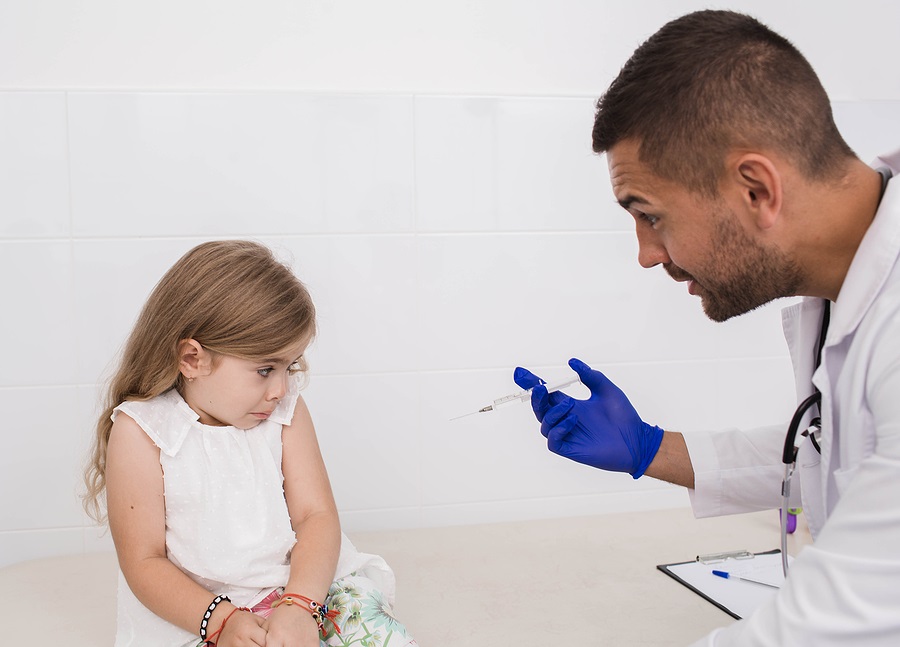
Virginia: OPPOSE SB104: Minor Children Consenting to Vaccination Without Parental Consent or Notification
by National Vaccine Information Center
Your action is needed to help stop a bill that was pre-filed 12/8/2019. Senator Barbara Favola is the Patron of this bill.
SB104 would add amend and reenact §54.1-2969 of the Virginia Code, relating to vaccinations/immunizations; minors; authority to consent. The bill would allow doctors or other medical workers to administer vaccines recommended by the U.S. Centers for Disease Control (CDC) to a minor child of any age after obtaining “consent” of the minor child and making a determination that the child has the ability to understand the risks and benefits associated with vaccines at the same comprehension level as an adult.
SB104 also legally makes a minor child an adult for the purpose of denying the child’s parents or legal guardian access to the child’s medical records that contain information on which vaccines the child has received.
The Virginia legislative session moves very quickly and your immediate action and close monitoring of this bad bill is vitally important.
ACTION NEEDED:
-
Contact your state senator and delegate and respectfully ask them to OPPOSE SB 104 in the 2020 legislative session. (see reasons to oppose below)
- As soon as possible, schedule an in-person meeting with your state senator and delegate to express to them how important it is to you that your fundamental right to make decisions concerning the upbringing, education and care of your child is not taken away.
- Attend events where your legislators may be speaking or presenting and express your concerns. Follow your legislators on social media so you can know when and where they will be attending and speaking during the interim so that you can attend and have opportunities to provide more information and ask questions.
- Also, call and email your legislators and ask them to OPPOSE SB104. Personal contact is most effective, but it is also important that your legislators receive as many phone calls and emails from their constituents as possible.
- Legislative contact information: you can login to the NVIC Advocacy Portal, click on the “State Teams” tab and then “My State,” and your elected officials are automatically posted on the right hand side of the page. You can click on their name to display contact information and social media accounts that you can follow.
- Contact the patron, Senator Barbara Favola and respectfully ask her to withdraw SB104.
- Login to the NVIC Advocacy Portal often to check for updates. We review bills and make updates daily. Bills can change many times over the legislative process and your timely visits, calls, and emails directed at the correct legislators are critical to this process.
- Please forward any legislative responses you receive to our Virginia directors at VADirector@NVICAdvocacy.org.
- Please forward this email to family and friends and ask them to register for the NVIC Advocacy Portal at http://NVICAdvocacy.org and share their concerns with their legislators as well. If you wish to share this alert on social media, go to the notes on the National Vaccine Information Center’s Facebook page and share it from there.
REASONS TO OPPOSE SB104:
Virginia ranks #6 among all states in high immunization coverage rates for children.(1) There is no evidence-based justification for the state of Virginia to suspend parental rights and administer vaccines to minors without parental consent.
The vaccination rates in Virginia are high and continue to rise. In the fall of 2018, 96.3% of kindergartners and 6th graders were in full compliance with vaccinations.(2) In the 2018/2019 school year, 97.6% of children had more than 1 dose of MMR compared to 93.4% in 1995.(3) In the 2018/2019 school year, 98% of kindergartners had all 5 doses of the DTaP.(4)
SB104 eliminates the long recognized, fundamental right of parents in the U.S. to make medical decisions for minor children that involve significant risks to a child’s health or well-being. This bill:
- Allows doctors or other medical workers to administer vaccines to a minor child without first obtaining the voluntary, informed consent of the child’s parent or legal guardian;
- grants a minor child the legal right to make the decision to receive a vaccine without the consent or notification of the parent or legal guardian; and
- grants a minor child the legal right to refuse to disclose personal medical records related to vaccination to a third party, including the child’s parents.
Vaccines are commercial pharmaceutical products, which carry a risk of injury or death that can be greater for some individuals. Minor children are often unaware of their own medical history or family history of vaccine reactions or other health conditions that can increase the risks of vaccination for some individuals.
SB104 grants unrestricted power to doctors and medical workers to administer vaccines to minor children of any age after making the personal determination that a minor child has the mental capacity and social maturity to fully comprehend the benefits and risks of receiving one or more vaccinations. However, the most glaring flaw in this proposed legislation is that it makes the dangerous, unscientific assumption that the brain of a minor child is fully developed enough to make a rational decision about risk taking.
A 2017 study examining the neuroscientific mechanisms that underlie the medical decision making capacities of a minor found that, for example, significant changes take place in the brain of adolescents that are associated with processing rewards and risks, self-regulation, and the effect of peers on decision-making. “Even though risk identification is mature in late adolescence, the way people of this age will deal with risks differs from that of adults.” An adolescent may be intellectually mature, but, they may lack emotional and social maturity and, “end up in precarious and risky situations and their behavior is often not consistent with their capacities.”(5)
SB104 allows minors to make a major decision involving health risks associated with a pharmaceutical product without their parents’ knowledge or consent, despite the fact that children have long been known to make impulsive choices they often later regret in favor of small rewards and short-term gain. Adolescents are especially vulnerable to peer pressure and product marketing campaigns and could be uniquely susceptible to authority-figure persuasion when there are offers of free gift cards, soda or ice-cream in exchange for “consent.”(6)(7)
Most importantly, parents know a child’s health and medical care history from birth. That first hand knowledge about a child’s mental, emotional, psychological and physical development, allergies and reactions to foods, prescription drugs and vaccines is a critical component when parents weigh the benefits and risks of vaccination for an individual child during the vaccine decision making process. Taking the parent out of the vaccine decision making process for a child and handing it over to medical doctors and government health officials, who have no legal responsibility or accountability for what happens to the child after the vaccines have been given, is a violation of the human right of parents to exercise informed consent to medical risk taking on behalf of minor children.
A bill that legally makes minor children adults for the purpose of denying parents and legal guardians access to a child’s medical records that contain information about vaccines the child has been given, is a prescription for state sanctioned abuse of children and their parents. How can a parent protect a child with a vaccine reaction history or effectively monitor a child for signs and symptoms of a life threatening vaccine reaction if the parent has no idea the child has been given one or more vaccines?
SB104 contradicts Virginia Codes that have established and recognized that parents have a fundamental right to make decisions concerning the upbringing, education and care of their children.(8) The bill flies in the face of Virginia Codes that recognize the importance of parental notification and consent including opt-out provisions when sensitive subjects are taught or personal information is collected in school.(9)(10)(11)(12)
SB104 goes against the Nation’s long-standing principle that parents have a fundamental right to raise their children without undue adverse interference by the State as set forth in numerous U.S. Supreme Court decisions. The Supreme Court found that, “deeply rooted in our Nation’s history and tradition, is the belief that the parental role implies a substantial measure of authority over one’s children. Indeed, “constitutional interpretation has consistently recognized that the parents’ claim to authority in their own household to direct the rearing of their children is basic in the structure of our society.” (13)
SB104 grants doctors and medical workers the power to treat minor children as adults, who have been given the authority to make their own major health care decisions contrary to the long-standing legal recognition that a state has the right to restrict minors from making major decisions without parental consent because minors lack the ability and experience to make informed and mature choices. The Supreme Court stated, “[T]he Court has held that the States validly may limit the freedom of children to choose for themselves in the making of important, affirmative choices with potentially serious consequences. These rulings have been grounded in the recognition that, during the formative years of childhood and adolescence, minors often lack the experience, perspective, and judgment to recognize and avoid choices that could be detrimental to them. Ginsberg v. New York, 390 U.S. 629 (1968), illustrates well the Court’s concern over the inability of children to make mature choices, as the First Amendment rights involved are clear examples of constitutionally protected freedoms of choice.”(14)
Virginia’s commitment to protecting minors from the responsibility of making complex benefit and risk decisions, which may have significant effects on their health and future, is evidenced by laws that forbid minors from getting a tattoo or a body piercing without their parent or legal guardian present or from purchasing tobacco and vape products until age 21.(15) These laws are in place because the Commonwealth recognizes that minors do not necessarily have the mental capacity and maturity to make decisions that are in their best long term interest.
Virginia’s recognition that minors do not have the mental capacity and maturity to make major decisions is further supported by VA Code granting the right to vote to qualified persons only over the age of 18 years old.(16)
Under SB104, it is likely that children could receive vaccines at school vaccine clinics. The NY Supreme Court has held that even when the state’s purpose of preventing the spread and transmission of a disease was “laudable”, parent’s constitutional rights were violated when a school program that did not have a parent opt-out provision was, “clearly a health service for the prevention of disease which requires parental consent.”(17) It follows that allowing minors to receive vaccines at school without parental consent, including an opt-out provision, would violate parents’ constitutional rights.
SB104 would force physicians and other vaccine administrators to violate the duty of care owed to family members of patients given a viral or bacterial vaccine because the doctor or medical worker would not have the opportunity or even the legal right to advise family members of the risks and precautions associated with vaccines.(18)
SB104 gives legally unaccountable individuals the power to persuade minor children to get vaccinated without the knowledge or consent of their parents. Doctors and medical workers should never be able to coerce impressionable minor children into giving “consent” to use of a pharmaceutical product or medical procedure that could cause injury or death without parental knowledge and consent. Should an adverse vaccine reaction occur, parents alone would be left to physically, emotionally and financially take care of a disabled or chronically ill child.
When the National Childhood Vaccine Injury Act of 1986 was passed, Congress never contemplated a minor child making the decision to get a vaccine. The Act clearly states that before the administration of certain vaccines(19), a health care provider shall give a copy of the CDC’s vaccine information materials to either the, “the parent or legal representative(20) of any child to whom the provider intends to administer such vaccine, or to any adult(21) to whom the provider intends to administer such vaccine.” There is no provision in the law that allows a health care provider to give a minor child the Vaccine Information Statement (VIS) materials for the purpose of consenting, without the parent’s knowledge or consent, to the administration of vaccines.
Vaccines are pharmaceutical products that carry a risk of injury or death and the Institute of Medicine, National Academy of Sciences, acknowledged in 2012 that there is individual susceptibility to reacting to and being harmed by vaccines and that doctors cannot reliably predict who will be harmed by vaccination:
“Both epidemiologic and mechanistic research suggest that most individuals who experience an adverse reaction to vaccines have a preexisting susceptibility. These predispositions can exist for a number of reasons—genetic variants (in human or microbiome DNA), environmental exposures, behaviors, intervening illness, or developmental stage, to name just a few— all of which can interact… Some of these adverse reactions are specific to the particular vaccine, while others may not be. Some of these predispositions may be detectable prior to the administration of vaccine; others, at least with current technology and practice, are not.”(22)
The 1986 Act created a federal Vaccine Injury Compensation Program (VICP) for children injured by CDC-recommended vaccines, and the VICP has awarded more than $4 billion to vaccine victims since 1988, although two out of three vaccine injured plaintiffs are turned away without financial support. The National Childhood Vaccine Injury Act of 1986 gave partial liability protection to manufacturers of CDC-recommended childhood vaccines. An amendment to the Act in 1987 gave liability protection to doctors and other medical workers administering vaccines and, in 2011, the U.S. Supreme Court Decision Russell Bruesewitz et al v. Wyeth et al effectively eliminated all civil liability for vaccine injuries and deaths from vaccine manufacturers, even when a vaccine company could have made a vaccine less likely to cause injury or death.
By consenting to receiving a federally recommended vaccine, a minor child is agreeing to give up legal rights to file an injury claim in a federal or state civil court of law, even if the child suffers brain injury or another permanent health problem from the vaccine. A minor child cannot fully understand the terms of the Vaccine Injury Act including the 3 year statute of limitations on filing a vaccine injury claim with the Vaccine Injury Compensation Program. The Act’s vaccine injury table lists certain injuries that may only be eligible to receive compensation if they occur within 30 days of vaccination. Minors would be solely responsible for getting confirmation and documentation that they have an injury on this chart within 30 days of vaccination and many minors cannot drive themselves to the doctor or hospital.
Minors would not even have to tell their parents that they received a vaccination so their parents may not know why a child is injured or sick preventing the minor child from receiving timely and proper medical care. It is also much less likely vaccine reactions will be recognized and documented by a child and filed with the Vaccine Adverse Event Reporting System (VAERS).
Virginia does not allow minors to represent themselves in court, but under VA SB104, minors would be held singularly responsible for filing a claim with Vaccine Injury Compensation Program.(23) Virginia does not recognizes the “mature minor doctrine” which allows a minor over the age of 14 or 15 years old who the court deems a “mature minor” to have the right to refuse medical care or treatment.(24)
It is clear that the intent of SB104 is to give power to doctors, medical workers and state health officials to persuade as many minor children as possible to consent to receiving all federally recommended vaccines, regardless of whether doing so is in an individual child’s best interest or the child’s parent or legal guardian has given informed consent to vaccination.
There is no public health emergency justifying the state overriding a parent’s legal and human right to make an informed benefit and risk decision about vaccination on behalf of their minor children. SB104 is a blatant attempt by the Commonwealth to strip parents of their legal right to make informed decisions about vaccination for their minor children and hand that legal right to doctors and medical workers, who have no liability or accountability for what happens to the child after vaccination. SB104 is a violation of parents’ constitutional right to raise their children without undue interference from the state.
Read the full article at the NVIC Facebook post.
Footnotes:
(1) America’s Health Ranking. Health of Women and Children. 2019.
(2) Virginia Department of Health. SIS Reporting Results. 2019.
(3) CDC. 2017 Childhood Measles, Mumps, and Rubella (MMR) Vaccination Coverage Report. Oct. 11, 2018.
(4) CDC. Vaccination Coverage with Selected Vaccines and Exemption Rates Among Children in Kindergarten-United States, 2018-2019 School Year. Morbidity and Mortality Weekly Report. Oct. 18, 2018.
(5) Grootens-Wiegers, Petronella, Hein, Irma M. et al. Medical decision-making in children and adolescents: developmental and neuroscientific aspects. NCBI. May 8, 2017.
(6) Ibid.
(7) Steinberg, Laurence. A Social Neuroscience Perspective on Adolescent Risk-Taking. NCBI. May 27, 2008.
(8) § 1-240.1. “Rights of parents: A parent has a fundamental right to make decisions concerning the upbringing, education, and care of the parent’s child.”
(9) § 22.1-207.1. Family life education.
(10) § 22.1-207.2. Right of parents to review certain materials; summaries distributed.
(11) § 22.1-207.2:1. Anti-bullying or suicide prevention materials; parental right to review.
(12) § 22.1-79.3. Policies regarding certain activities.
(13) Bellotti v. Baird, 443 U.S. 622 (1979) citing Ginsberg v. New York, 390 U.S. 629 (1968).
(14) Ibid.
(15) Howard, Jacqueline. US raises legal age to buy cigarettes, vapes to 21. CNN. Dec. 20, 2019.
(16) § 18.2-371.3. Tattooing or body piercing of minors.
(17) Matter of Alfonso v. Fernandez, 195 A.D.2d 46, 59 (N.Y. App. Div. 1993).
(18) Tenuto v. Lederle Labs, 90 N.Y.2d 606 (N.Y. 1997).
(19) Diphtheria, tetanus, pertussis, measles, mumps, rubella, polio, hepatitis A, hepatitis B, Haemophilus influenzae type b (Hib), influenza, pneumococcal conjugate, meningococcal, rotavirus, human papillomavirus (HPV), or varicella (chickenpox).
(20) “Legal representative” is defined as a parent or other individual who is qualified under state law to consent to the immunization of a minor child or incompetent adult.
(21) In the case of an incompetent adult, relevant VISs shall be provided to the individual’s legal representative. If the incompetent adult is living in a long-term care facility, all relevant VISs may be provided at the time of admission, or at the time of consent if later than admission, rather than prior to each vaccination.
(22) Institute of Medicine Committee to Review Adverse Effects of Vaccines. Evaluation of Biologic Mechanisms of Adverse Effects: Increased Susceptibility. Chapter 3 (p. 82). Washington, D.C. The National Academies Press 2012.
(23) § 8.01-271.1. Signing of pleadings, motions, and other papers; oral motions; sanctions.
(24) Snyder, Kevin E. MD, West, Rebecca W. JD et al. Medical Informed Consent. University of Virginia Health Sciences Center, 2013.
Sincerely,
NVIC Advocacy Team
National Vaccine Information Center
http://NVIC.org and http://NVICAdvocacy.org
https://nvicadvocacy.org/members/Members/ContactUs.aspx
The National Vaccine Information Center (NVIC) works diligently to prepare and disseminate our legislative advocacy action alerts and supporting materials. We request that organizations and members of the public forward our alerts in their original form to assure consistent and accurate messaging and effective action. Please acknowledge NVIC as originators of this work when forwarding to members of the public and like-minded organizations. To receive alerts immediately, register at http://NVICAdvocacy.org, a website dedicated to this sole purpose and provided as a free public service by NVIC.
Leaving a lucrative career as a nephrologist (kidney doctor), Dr. Suzanne Humphries is now free to actually help cure people.
In this autobiography she explains why good doctors are constrained within the current corrupt medical system from practicing real, ethical medicine.
One of the sane voices when it comes to examining the science behind modern-day vaccines, no pro-vaccine extremist doctors have ever dared to debate her in public.
-
Book – The Vaccine Court, by Wayne Rohde – 240 pages
“The Dark Truth of America’s Vaccine Injury Compensation Program”
FREE Shipping Available!
ORDER HERE!




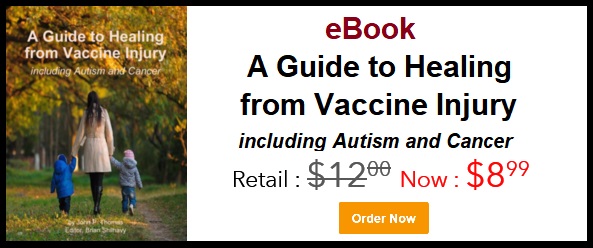
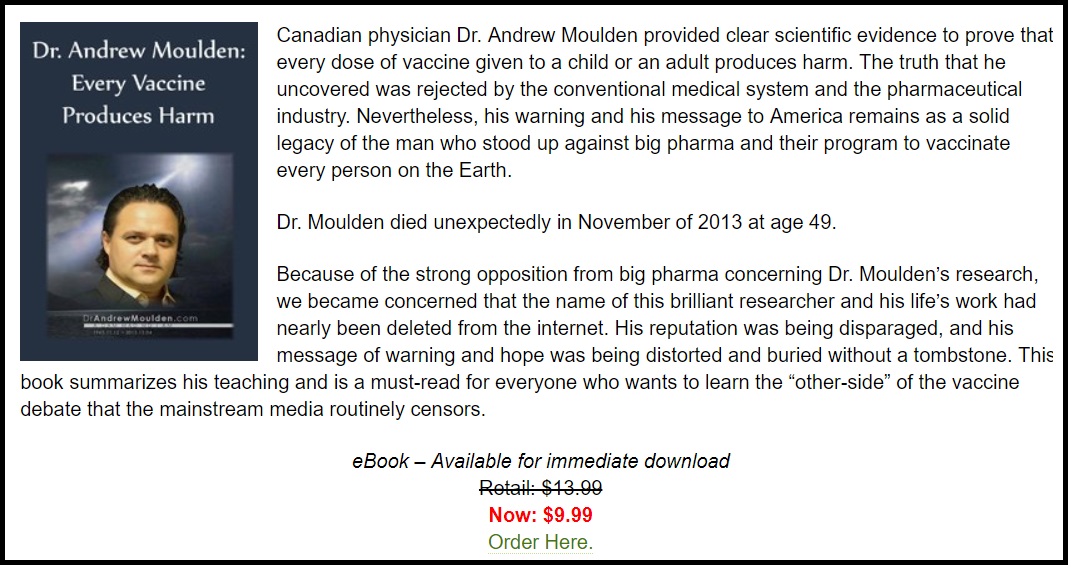
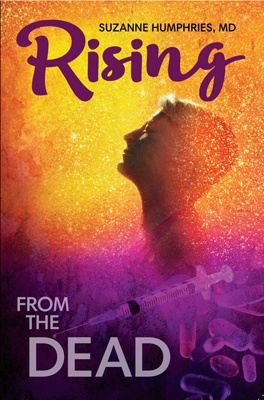
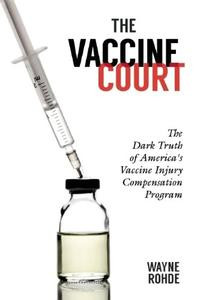
7 Comments